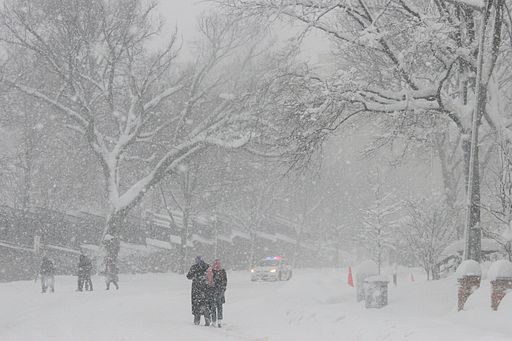Podcast: Play in new window | Download
Subscribe: RSS

When snow comes to DC, the capital of the Free World falls to its knees. When snow is forecast, by anybody, likewise. (Photo by Al Jazeera)
Two weeks ago Monday, the first person in the door in the morning couldn’t wait to share: “Did you hear? We’re going to have a monster snowstorm this weekend. They say we should be prepared for power outages and blizzard conditions!” All day long, from the UPS driver to the grocery clerk, “Did you hear? They say…” As is my habit, I asked who “they” was. The furthest I could get into the terrible vagueness of being “they” was a couple of remarks about somebody somebody knew reading it somewhere on Facebook.
Facebook? I get my weather forecasts from the National Weather Service, which is where Weather.com, AccuWeather, Weather Underground, Live at Five, Storm Central and everybody else gets their data (nobody else can afford to collect the data) and their forecast guidance. It used to be a condition of use of NWS data that you did not alter in any way the forecasts they gave you, and most TV and radio stations don’t play around with them, other than to substitute “I think it’s going to…” wherever they see the words “the forecast is that it will…..”
But now, apparently, there is a Facebook weather page that does not believe in such restraint. I checked with NWS, and found no mention of any snowstorm forecast for the weekend. Now, I knew I wouldn’t, because the NWS doesn’t even try to forecast storms that far ahead. Pretty much everything out beyond five days is flip-a-coin territory, but often they can see possibilities, and sometimes they will warn of possibilities. That’s not a forecast, it’s a heads-up.
You know what else is not a forecast? A model run. Weather services have computer programs that cook billions of data sets to try to emulate how the weather will develop over the next few days. No computer model can some close to taking everything into account. You’re talking about vast interactions of air and water, spinning clockwise, counterclockwise and vertically, water currents pushed by wind, air currents warmed and cooled by water, all interacting with the surface of a spinning globe. The formula that could predict all those actions and reactions will never be written, and the computer that could run the formula will never be built. Each primitive model is a blind man fondling an elephant.
Forecasters look at all the models, average them out, season them with experience and human intuition, and issue a forecast. But the weather guys and gals of TV and Internet fame like to seize on a model that shows what they like or fear the most, and run with it. This is the source of much cynicism about the accuracy of weather “forecasts.”
As the week went by, the weather buzz got worse, until people were sweeping the stores for toilet paper and milk — again. As the weekend came within the three-day forecast window. all that appeared in the NWS forecast was an expectation of a skiff of snow Sunday night. Which is what we had.
By Monday, however, the NWS was directing our attention to Thursday. By Tuesday there was a watch, and on Wednesday a winter storm warning from 9pm through Thursday. But no Facebook buzz. I didn’t check the site to see what it was saying, all I know is that the tellers and clerks and UPS guys were not aroused. In fact, when it came time to decide whether to cancel a meeting scheduled for Thursday, one of the group said, “It’ll probably go out to sea like the last one.”
The implication was that since the last forecast was wrong, this one was likely to be wrong as well. After all, both forecasts came from the same “they,” didn’t they? Wrong. The snow started at 9, give or take a few minutes, and dumped two feet on us by Thursday evening.
A silly little story, maybe, but here’s the point. One who qualifies and checks sources of information is much less likely to be holed up at home when there’s no blizzard, or to be stuck in a snowbank far from home when there is one. And there’s a broader point; no one who checks and verifies information sources, and reads them carefully, is likely to be a climate-change denier (employees of Exxon Mobil excepted).
In this Information Age it is easier than ever to get, check and source information. Yet we seem to be turning into a nation of mouth-breathing science deniers. One in four of us Americans thinks the sun orbits the earth; an amazing proportion of us does not believe in evolution, or in climate change.
Why? Because it takes effort to understand, even more to check. A probability of showers is not a forecast of rain; a storm watch is not a warning; a snowstorm does not disprove the reality of climate change. Google can bring us the facts, but we have to being some muscle to the table if we intend to carry away anything of use.
As the astrophysicist Neil deGrasse Tyson told Bill Moyers the other day the success of democracy requires a certain level of scientific literacy among its citizens. And we’re not there yet.
Nicely put